Some people experience unexplained feelings of sadness, anxiety, or depression after eating white bread, pasta, or other wheat-based products. This isn't just a fleeting feeling; it may stem from a complex biological reaction involving gluten.
Around 10% of the population unknowingly has non-celiac gluten sensitivity (NCGS), while nearly 40% of people with celiac disease experience symptoms of depression at some point in their lives. Celiac disease is an autoimmune disorder that causes the immune system to attack the small intestine when gluten is consumed. These figures are drawing scientific attention to the link between gluten, a common ingredient in bread and flour products, and mental health.
Professor Deanna L. Kelly, a psychiatry expert at the University of Maryland School of Medicine, was once skeptical about the role of food in treating mental illness. However, after 17 years of research and leading clinical trials, she has come to believe that what people eat can significantly impact brain function.
Her research began with data from World War II, which showed a decrease in hospitalizations for mental illness during periods of wheat scarcity. Kelly and her colleagues further analyzed the work of Dr. Curtis Dohan from the 1970s, which documented cases of schizophrenic patients who improved after eliminating wheat from their diets. He also studied communities in Papua New Guinea, where wheat was absent from the diet and schizophrenia was virtually unheard of.
Taking it a step further, the team conducted clinical trials on antibodies that react to gluten. The results revealed an unusually high rate of gluten antibodies in people with schizophrenia. This led to the hypothesis that, in some individuals, gluten may cause inflammation that affects the brain.
Gluten is a group of proteins found in wheat, barley, and rye, commonly present in bread, pasta, and ultra-processed foods. In gluten-sensitive individuals, the immune system treats this protein as an intruder, producing antibodies to attack it. This process causes intestinal inflammation, damages the lining of the gut, and allows antibodies to leak into the bloodstream, potentially affecting the brain.
One of the protein components of gluten, called gliadin, has a similar structure to the GRINA receptor in the brain. This confusion causes the immune system to attack brain tissue, leading to a range of symptoms such as foggy thinking, fatigue, anxiety, mood swings, hallucinations, or seizures. Many cases are also resistant to conventional medication.
The amygdala, the brain region that controls emotions and fear responses, becomes overactive when inflamed, increasing anxiety. Meanwhile, serotonin, a key neurotransmitter linked to mood, is primarily produced in the gut. Intestinal distress can reduce serotonin levels, contributing to anxiety and depression.
While not everyone reacts negatively to gluten, statistics suggest that approximately 10% of the population has NCGS. Furthermore, many individuals with celiac disease remain undiagnosed. A large study of over 2,000 people with celiac disease indicated that nearly 40% of them experienced lifelong depression symptoms.
 |
Some people experience unexplained sadness and lethargy after eating bread. Photo: *Telegraph* |
Kelly shared the case of a schizophrenic patient who relapsed severely each time they ate gluten-containing foods. Upon hospitalization, the patient was typically given a standard diet with gluten, despite warnings from the family, which exacerbated their condition.
Not only gluten, but other proteins such as casein in milk can also trigger inflammatory responses in the brain. Additionally, ultra-processed foods (UPF) in the Western diet are thought to contribute to mental health issues. Wheat, which provides 20% of global calories, is being processed in ways that increase gluten and gliadin content significantly compared to the past.
Antibody tests are gradually revealing important clues. Kelly discovered signs of celiac disease in a young woman previously misdiagnosed, thanks to TTG testing and an intestinal biopsy. Among nearly 1,000 patients she examined, the majority who eliminated gluten from their diets reported improvements in mood, joint pain, digestion, or alertness.
About 30% of schizophrenic patients in the study had antibodies against gliadin, indicating their bodies were mounting an immune response to gluten.
Kelly currently follows a low-carbohydrate, nearly gluten-free diet. She cautions that a gluten-free diet isn't suitable for everyone, as many gluten-containing foods provide essential vitamins and minerals, such as folic acid. Dietary changes should be made under the guidance of a doctor or nutritionist.
Another important point is that individuals with mental illness often face difficulties maintaining special diets. Gluten-containing foods are inexpensive and convenient, while preparing fresh vegetables requires time and effort.
The case of an epilepsy patient clearly demonstrates the link between gluten and brain health. His seizures worsened every time he ate pasta, despite testing negative for celiac disease. After adopting a gluten-free diet, the seizures disappeared.
According to Kelly, with the help of brain imaging technology and antibody tests, scientists can now begin to connect the data and demonstrate the link between food and mental health. What people put into their gut can profoundly affect their brain.
Thuc Linh (*Telegraph*)












